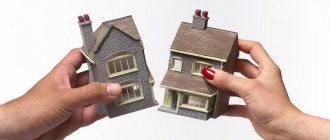Legislative consolidation of the program
At the moment, state policy is aimed at actively helping disadvantaged families who do not have the opportunity to independently purchase housing. Citizens officially recognized as needing housing can count on support from the state.
Financial assistance is mainly expressed in the form of subsidies aimed at expanding living space.
To obtain the right to the opportunity to improve living conditions with the help of the state, the applicant must correspond to one of the groups of persons specified in Article 51 of the Housing Code of the Russian Federation.
Having confirmed the status of those in need of expansion of living space on the basis of Art. 51 of the Housing Code of the Russian Federation, an administration employee puts a family or an individual citizen in line to receive benefits. The procedure for keeping records of people in need is regulated in Article 52 of the Housing Code of the Russian Federation, which describes the Bodies authorized to accept applications and documents for placement in the queue, as well as the deadlines for making a decision.
Article No. 54 of the Housing Code of the Russian Federation regulates the rules that allow applicants to be refused registration in the queue for the expansion of living space.
Article No. 54 of the Housing Code of the Russian Federation regulates the rules that allow applicants to be refused registration in the queue for the expansion of living space.
Download documents for viewing and printing:
Article 51 of the Housing Code of the Russian Federation
Article 52 of the Housing Code of the Russian Federation
Article 54 of the Housing Code of the Russian Federation
Requirements for the applicant to obtain the opportunity to improve living conditions
In addition to all of the above, the applicant is subject to additional requirements:
- He must be a citizen of the Russian Federation.
- The applicant is an adult. Similar programs apply for children, but legal guardian representatives must apply instead.
- Previously, the applicant had not been observed to act leading to a deliberate deterioration of living conditions.
Example: Some people, in order to show how bad their life is, register many relatives in their apartment. It turns out that the standard area for each of the residents will be less than the established one. Typically, such fraud is quickly identified and the applicant is banned from participating in such government programs for a period of 5 years.
Types of government support
Today the state offers several options for helping those in need. Each case is considered separately and depends not only on the category of the applicant, but also on the region of application.
Each subject of the Russian Federation is ready to offer special programs and subprograms aimed at improving the living conditions of various social groups. In addition, banking and other commercial organizations can offer their preferential terms to help citizens in need.
Mainly, measures to expand housing space come down to the following actions:
- Providing a mortgage loan at a reduced rate.
- Granting subsidies to pay the down payment on a mortgage loan or to reimburse part of the cost of housing.
- Special programs for purchasing housing on the primary market.
- Allocation of an apartment under a social tenancy agreement.
- Targeted programs for the purchase of housing (teachers, medical workers, military personnel, etc.).
- Allocation of land plots to preferential categories of citizens on special preferential terms or free of charge.
Types of housing programs
One way to get a new home or financial compensation for part of it when purchasing is to become participants in one of the housing programs.
Today, those who are on the waiting list for housing expansion are actively participating in the federal Housing program. Within the framework of this program, there are various branches designed to improve the current housing situation among certain social segments of the population.
Particularly popular are programs to support young families, offering housing certificates or subsidies to spouses under the age of 35.
Thanks to the possibilities of housing programs, citizens use several ways to improve their living conditions:
- Issuance of a certificate for an apartment.
- Issuing a mortgage loan on preferential terms.
- Assistance in purchasing an apartment from local authorities at a reduced cost.
- Subsidy allocation.
Housing subsidies
The main measure to improve the living conditions of certain social categories is the provision of housing subsidies. By offering subsidies, the state provides financial support in the following areas:
- Purchasing an apartment in an apartment building.
- Purchasing a home (for certain groups of people).
A subsidy is free assistance from the federal authorities or a municipality; it does not take the form of an installment plan or loan. The peculiarity of housing subsidies is the limited period of their use and their intended purpose. Material assistance aimed at expanding housing conditions cannot be used for education or other purposes.
As a rule, the subsidy is allowed to be used within 12 months after receiving the certificate. Assistance is allocated at a time and is provided only once within the framework of one of the programs for expanding living space. In addition to the funds allocated by the state as part of the subsidy, you can use personal or borrowed funds when purchasing a home.
The Housing Code of the Russian Federation mentions the rights of citizens to receive housing subsidies. The form and procedure for providing support is controlled by certain legislation of each region of the Russian Federation, for each group of beneficiaries separately.
Use of maternity capital
After the entry into force in 2007 of a form of state support for young families with 2 or more children called “Maternity Capital,” an increasing number of families are seeking to take advantage of capital as a chance to improve their living conditions.
Maternity capital is a federal monetary certificate for a special purpose, which can only be used once.
It is assumed that the certificate can be used not only to expand living space, since there are several ways to implement maternity capital, including increasing the amount of the mother’s pension.
But most often citizens take advantage of the housing benefits provided by maternity capital:
- Purchase or construction of residential premises. Funds can be transferred directly to the seller, to pay off a mortgage loan, used as a down payment when applying for a mortgage loan, or transferred to the contractor's escrow account.
- Construction, reconstruction of individual housing construction.
You can use maternity capital an unlimited number of times, using the amount guaranteed under the program. The amount of the remaining maternity capital can be found out in the Pension Fund or requested on the government services website in your personal account. The amount of maternity capital must be indexed annually. In 2021, the amount of federal maternity capital is 453,026 rubles. The program has been extended until the end of 2022.
Using the certificate to pay off debts or to open an interest-bearing deposit in a bank is prohibited by law. It is also unacceptable to cash out maternity capital. These prohibitions were created to help parents, as they save funds received under the certificate from unreasonable waste.
In addition to the federal certificate, some regions implement their own measures to support families with two or more children - regional family capital. The amounts offered by the regions are, of course, smaller, but nevertheless serve as support for families with children, including in improving their living conditions.
To clarify whether your region provides such a support measure, you need to contact the social protection department at your place of residence.
Who has the right to expand living space?
Only a few categories of citizens can get on the waiting list for improved housing conditions:
- Persons who are not home owners or family members of the owner of the residential premises.
- Citizens who do not live in the apartment under a social tenancy agreement and who are not members of the tenant’s family.
- Residents of houses or apartments in an apartment building that does not meet the requirements established for residential premises.
- Citizens living with several families in a residential building, if the family includes a patient suffering from a severe form of a chronic disease, in which living together with him is impossible.
- Citizens who are owners of residential premises or tenants of housing, the area of which is recognized as below the accounting norm for one family member.
Situations cannot be excluded when the applicant or his family members own several premises or manage them under a social tenancy agreement. Then the degree of need for improvement of living conditions is calculated based on the total total value of available living space.
Where to apply for improved housing conditions
As mentioned above, you need to submit an application for recognition as a low-income person to the social protection authorities. After this, to directly participate in the program to improve housing conditions, you need to contact the local administration. However, there are simpler options:
- Through MFC (My Documents). This organization is, in fact, an intermediary between the population and government agencies. In order to become a participant in the program to improve housing conditions, you can contact us here. The main advantage is that all actions, from obtaining low-income status to participating in the program, are performed in one place. Among the shortcomings, it should be noted only a slight increase in the processing time, by about 3-7 days. This time is required for MFC employees to process information and transfer all papers to the necessary authorities.
- Through the portal "State Services". In many ways, the situation with this type of application is similar to applying to the MFC (My Documents), but, firstly, you will have to search for the necessary online forms yourself, and secondly, despite the fact that the application information will be sent through Internet, ultimately the client will still be required to personally visit government agencies and provide all the same documents “live.”
The procedure for obtaining state support
Before taking any action to obtain support from the state, you should make sure that there is a chance of success:
- Determine whether you belong to a preferential category of citizens.
- Find out the accounting standards for living space per person in the region of residence, and then make calculations for existing housing, comparing the results with the conditions for receiving a subsidy.
- Contact your local social security authorities for further advice.
Next, the applicant must:
- Collect a package of documents and certificates required to obtain the status of a person in need of housing.
- Submit documents to the commission appointed by the authorized body (in most cities, the function of accepting documents for transfer to the specialized commission is assigned to multifunctional centers).
- Get the status of a person in need.
- Register in line for expansion of housing conditions (at the administration, MFC or through electronic government services).
The completeness of the documents provided is checked upon acceptance of the documents. The reliability of information about the applicant is established by a special commission, to which documents are submitted within the prescribed time frame.
If the applicant’s living conditions and social category meet the conditions for receiving a subsidy, then they are required to accept his documents and register him in the queue. In cases where a citizen belongs to several preferential categories, he has the right to use the subsidy only on one of the grounds.
Required documents
To register in the queue as someone in need of housing, the authorities require a package of certificates from applicants, which includes:
- Passport and other identification documents of the applicant and his relatives (including minors).
- Certificates confirming marital status (certificate of marriage or divorce).
- Confirmation of the right to own or dispose of residential premises (certificate from Rosreestr or social tenancy agreement).
- Confirmation of family composition (extract from the house register).
- Documents confirming your relationship to one of the preferential categories.
The list of required documents can be supplemented by regional authorities and vary depending on membership in a particular preferential category.
Queue
There are no specific rules controlling the order of formation of a queue for the expansion of living space. This process is not regulated at the legislative level; local authorities are responsible for it. That is why in most regions of the Russian Federation the queue has not moved for years.
Large families, which are a priority for the state, as well as military personnel who are participants in the savings mortgage system, receive benefits the fastest.
Sample application:
Sample applications may have a different structure and form depending on who exactly is submitting them and for what reason. Let's look at the most common options.
For disabled people
Large family
For WWII veterans
To employees of the Ministry of Internal Affairs
Last changes
For residents of the capital, starting from 2021, they can increase their living space by purchasing additional meters of housing. This opportunity arose for those residents of Moscow who fell under the first wave of renovation and received new housing from the city.
This is not the only opportunity to improve living conditions. Together with AHML, the city leadership is developing a preferential mortgage program. Additional opportunities to expand living conditions will be offered to residents of the capital soon.
Our experts monitor all changes in legislation to provide you with reliable information. Subscribe to our updates!








